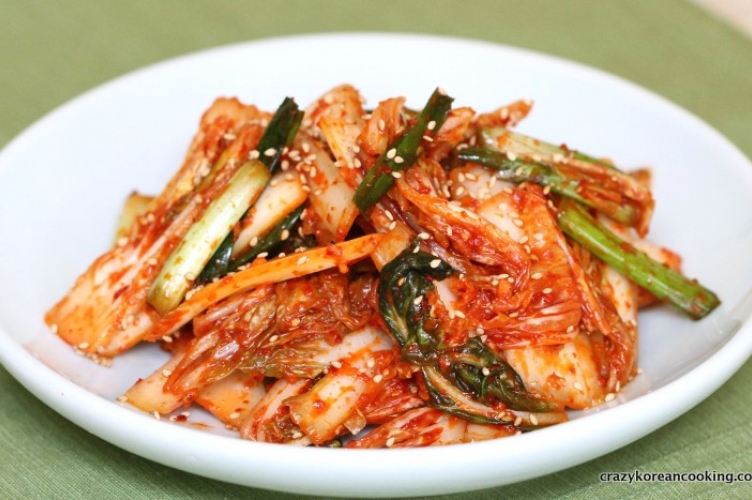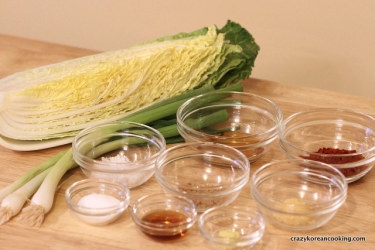Fresh Kimchi (Quick & Easy), Baechu Geotjeori
배추겉절이

Koreans make Baechu Geotjeori (Gut-jeo-ri) when there is no kimchi or when they crave for a refreshing side dish to complement heavy dishes. (Baechu means “napa cabbage.” Geotjeori means “lightly salted.” Baechu Geotjeori can be enjoyed with any meal but it is often paired with seoleongtang (ox tail soup) and kalguksu (Korean handmade noodles soup). It is popular during the spring and summer time when good napa cabbages are in season but it can be enjoyed throughout the year.
Unlike Bachu Kimchi (the classic kimchi), Baechu Geotjeori is not fermented and meant to be eaten as soon as it’s made. Bachu Geotjeori doesn’t have the depth in flavor the classic Bachu Kimchi has but is more refreshing and is crispier in texture.
Buy Korean ingredients online here.
Koreans make Baechu Geotjeori (Gut-jeo-ri) when there is no kimchi or when they crave for a refreshing side dish to complement heavy dishes. (Baechu means “napa cabbage.” Geotjeori means “lightly salted.” Baechu Geotjeori can be enjoyed with any meal but it is often paired with seoleongtang (ox tail soup) and kalguksu (Korean handmade noodles soup). It is popular during the spring and summer time when good napa cabbages are in season but it can be enjoyed throughout the year.
Unlike Bachu Kimchi (the classic kimchi), Baechu Geotjeori is not fermented and meant to be eaten as soon as it’s made. Bachu Geotjeori doesn’t have the depth in flavor the classic Bachu Kimchi has but is more refreshing and is crispier in texture.
Buy Korean ingredients online here.
INGREDIENTS
shop these ingredients online »| 12 oz | Napa Cabbage 배추 (1 whole napa cabbage weighs between 2.2 lb - 5 lb or 1 kg - 2.3 kg) | |
| 2 tbs | Coarse Sea Salt 굵은 소금 | |
| 3 | Green Onion 파 | |
| 1 tbs | Garlic (minced) 다진 마늘 | |
| ½ tsp | Ginger (minced) 다진 생강 | |
| ¼ cup | Gochugaru, Korean Hot Pepper Flakes 고춧가루 (amount may vary depending on the brand) | |
| 3 tbs | Anchovy Fish Sauce 멸치액젓 (or shrimp fish sauce, amount may vary depending on the brand) | |
| 2 tsp | Sugar 설탕 (vary the amount to your liking) | |
| 1 tbs | Sesame Oil 참기름 | |
| 1 tsp | Sesame Seeds 깨 |

Optional Ingredients and Substitutions
Coarse sea salt:
You can use kosher salt. But, coarse ones are better than fine ones. If the particles are too small, it may speed up the brining process too much that the texture of kimchi may not be as crispy.
We don’t recommend using table salt (iodized salt).
You can buy coarse sea salt from local Korean market or order online here.
Anchovy fish sauce:
You can use shrimp fish sauce instead. If you are using shrimp fish sauce, mince the shrimp bits before using it.
Good to Know
You can sprinkle salt and let it sit anywhere between 20-60 min. The shorter the time, the crispier the texture but the leaves may taste a bit bland.
If possible, choose soft leaves from napa cabbage.
Baechu geotneori is best when eaten immediately after making it. You can keep it in the fridge for a few weeks without spoilage. But, for best tasting baechu geotjeori, you want to eat it within a day or so.
instructions |
photos |
summary |
|---|---|---|
Ingredient amounts in the recipe instructions are for the default serving size. |
Click to enlarge photos. |
Ingredient amounts in the recipe summary are for the default serving size. |
1. Prepare Napa CabbageWash and cut (or tear) 350g (about ¼ or less depending on the size) of Napa cabbage into 2” to 3” (or 5 cm)-long strips. If the leaves are too big cut in half length wise first. |
1
Wash & Cut
| |
2. Sprinkle saltSprinkle with 2 tablespoons of coarse sea salt all over the cabbages and mix it up gently. Let it sit for 20-60 minutes depending on your preference and time restrictions. (Flip the cabbages once after some time has passed so the salt is absorbed evenly.) |
2
Sprinkle 2 tbs coarse salt Leave Flip once | |
3. Prepare Green OnionWhile seasoning, prepare green onion. Wash and cut 3 green onions into 2-3” (5 cm) pieces. |
3
Wash & Cut
| |
4. Wash & drainWash the seasoned cabbage leaves thoroughly 2-3 times. Drain all the water out by placing them over a strainer. Then, squeeze all the water out by hand. |
4
Wash 3 times Drain Squeeze water out | |
5. Add red chilli pepper flakesPlace the seasoned cabbage leaves in a mixing bowl and add 4 tablespoons of red chilli flakes. Mix well until the leaves evenly have vibrant red color. |
5
Mix cabbages with
| |
6. Add seasoning ingredientsAdd the cut green onions, 3 to 3½ tablespoons of anchovy fish sauce, 2 teaspoons of sugar, 1 tablespoon of minced garlic and ½ teaspoon of minced ginger. Mix well. The amount of anchovy fish sauce may vary depending on how long you salted the cabbages and depending on the brand of the fish sauce. Add gradually while tasting. You can also use shrimp fish sauce instead. You can add more or less sugar to your liking. |
6
Add
Mix well | |
7. FinishAdd 1 tablespoon of sesame oil and 1 teaspoon of sesame seeds. Mix well. If you are not eating it right away, store in the fridge and add sesame oil and sesame seeds just before serving. |
7
Add
Mix | |
8. EnjoyServe on a nice side dish plate. |
8
Serve |












 30 min
30 min
Comments